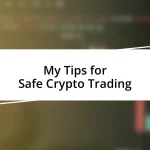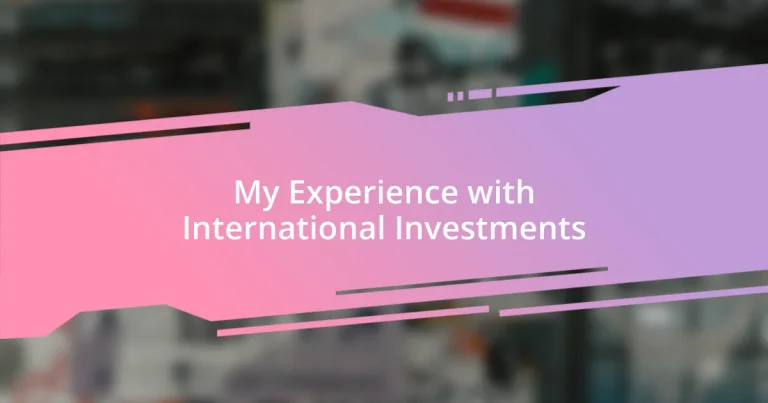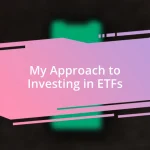Key takeaways:
- Diversification is crucial for managing risks associated with international investments, helping to buffer against market fluctuations.
- Understanding local market conditions, including political stability and cultural nuances, is essential for making informed investment decisions.
- Building a network with local experts can reveal lucrative opportunities and enhance one’s understanding of emerging markets.
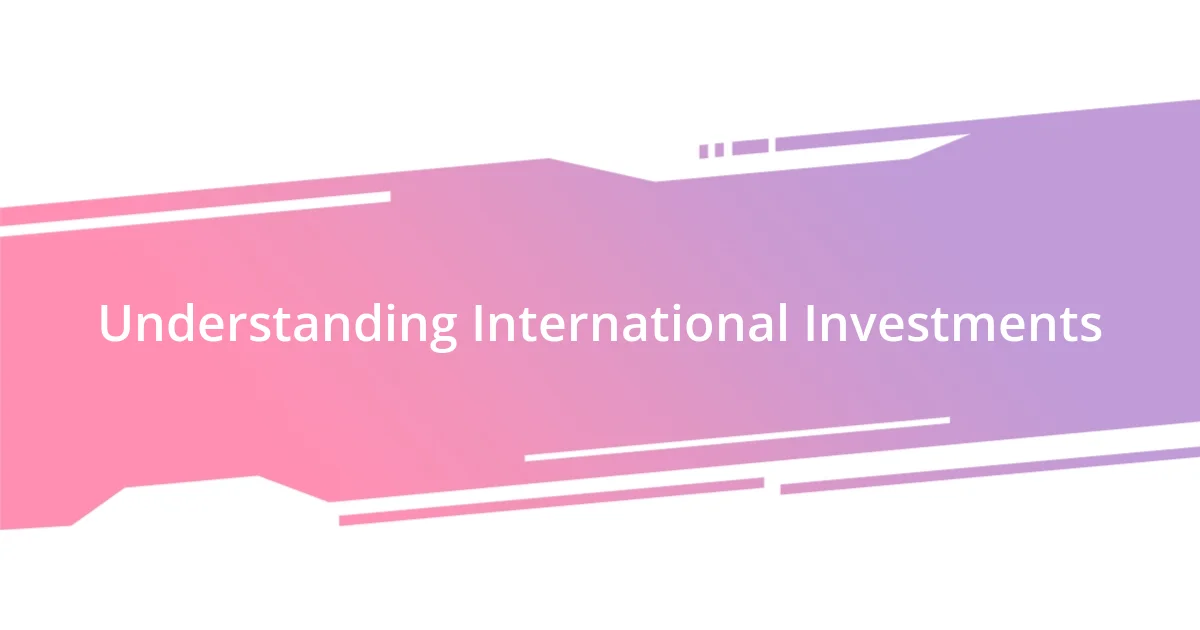
Understanding International Investments
When I first delved into international investments, I was amazed by the array of opportunities available across borders. It’s like opening a treasure chest – so many countries, each with unique markets and assets waiting to be explored. But I often found myself asking: how do I navigate these diverse landscapes without feeling overwhelmed?
Understanding international investments isn’t just about picking stocks or bonds in foreign markets; it’s about grasping the political, economic, and cultural nuances that influence them. I vividly remember a time when I invested in a startup overseas. The potential excited me, but suddenly, I was faced with regulations and market dynamics that were foreign to me, reminding me of the importance of thorough research. Have you ever experienced that rush of excitement only to be met with unexpected challenges?
One critical insight I’ve gained is the value of diversification. By spreading investments across different geographies, I’ve managed to buffer my portfolio against fluctuations that often hit specific markets. It’s a lesson I learned the hard way when one of my overseas investments tanked due to local economic turmoil. This experience made me appreciate the adage: “Don’t put all your eggs in one basket.” What about you? Have you considered how diversifying your investments could protect you from similar pitfalls?
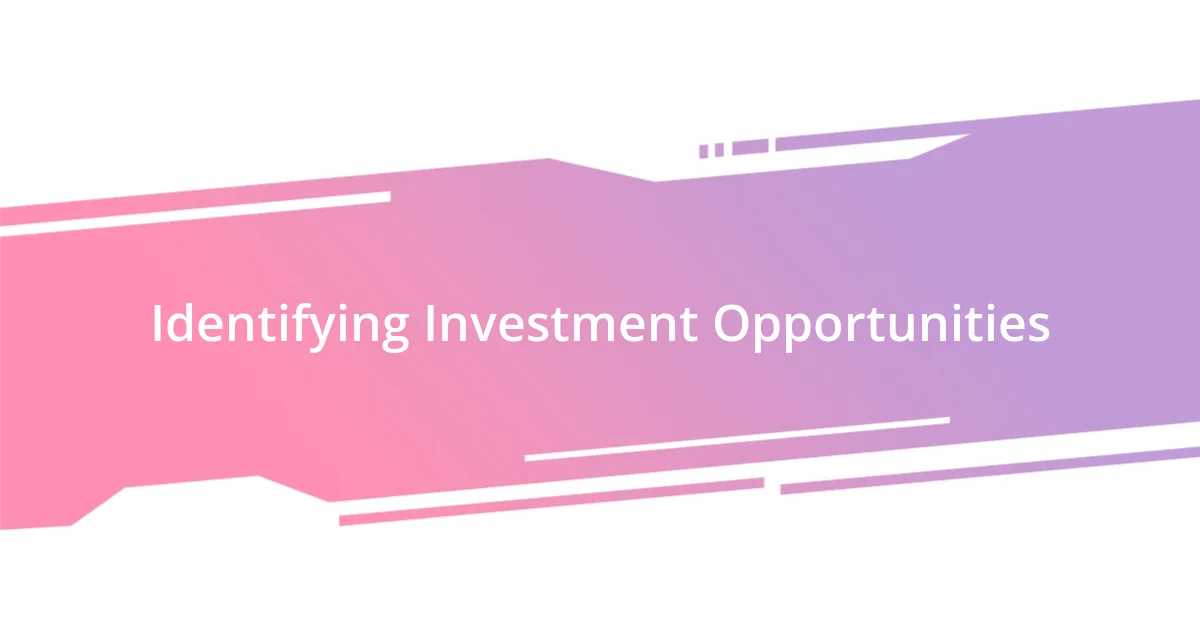
Identifying Investment Opportunities
Identifying lucrative investment opportunities internationally can feel like hunting for hidden gems. I recall a moment when I stumbled upon a tech startup in Southeast Asia. It wasn’t just the innovation that drew me in; it was the vibrant entrepreneurial spirit in the region. I learned that paying attention to local trends often reveals opportunities that may not be evident at first glance. Have you ever noticed how some sectors thrive in specific environments?
In my journey, I’ve realized that networking plays a crucial role in uncovering investment opportunities. During a business seminar in Europe, I had a chance encounter with an investor who introduced me to exciting prospects in renewable energy. By engaging in conversations with locals and industry experts, I’ve often found insights that traditional research might overlook. Do you think networking can open new doors for you too?
A valuable method for identifying opportunities is through analyzing economic indicators and emerging markets. For instance, I keep a close eye on GDP growth rates, employment statistics, and consumer spending patterns. One time, I put my money into a country that showed signs of economic revival after a downturn, and it paid off remarkably well. Investing based on a thorough analysis can often yield results that align with my financial goals. What indicators do you find most useful in your investment decisions?
| Method | Details |
|---|---|
| Networking | Building connections with local experts can reveal non-obvious opportunities. |
| Market Analysis | Evaluating economic indicators helps in predicting growth prospects. |
| Local Trends | Observing sector-specific developments can lead to earlier investments in high-potential areas. |
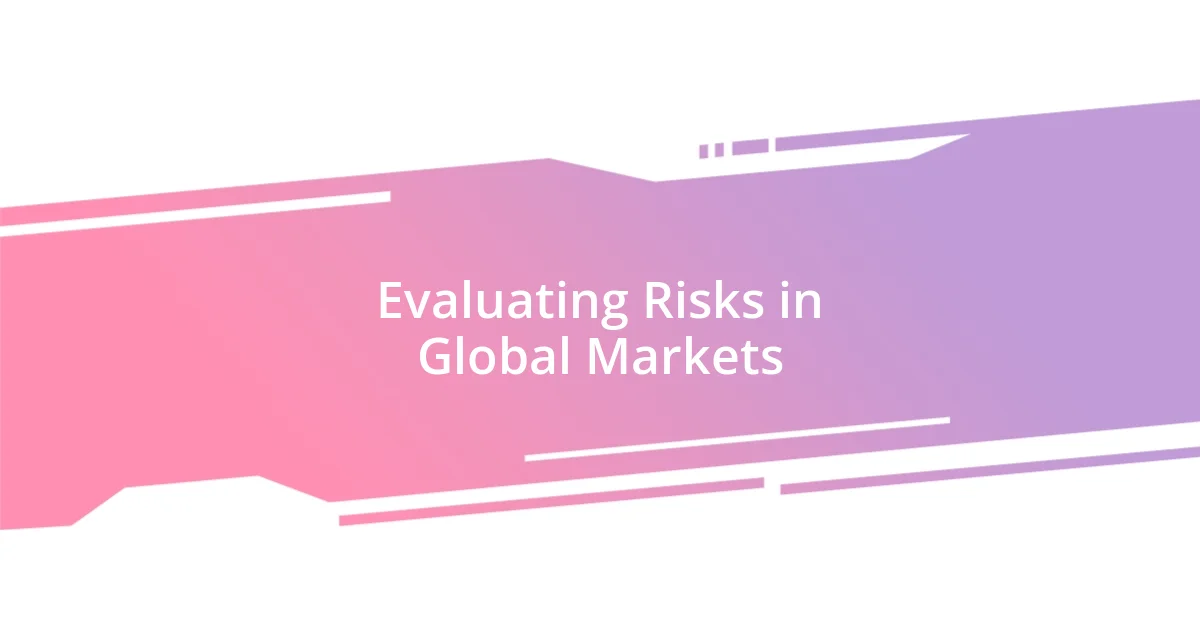
Evaluating Risks in Global Markets
Evaluating risks in global markets requires a keen eye and a solid understanding of both macroeconomic factors and localized conditions. I remember feeling a mix of excitement and unease when I considered investing in a volatile emerging market. It was a thrill to think about potential returns, but the looming uncertainty made me realize just how crucial it is to assess risks before jumping in. Have you ever felt that tension between opportunity and caution?
When evaluating risks, it’s essential to consider various factors that can influence your investment. Here are some areas I focus on:
- Political Stability: A country’s political environment can greatly impact investments. I once hesitated to invest because of upcoming elections; my instincts turned out to be right when the political climate changed drastically post-election.
- Economic Conditions: Analyzing GDP growth, inflation rates, and employment statistics can provide foresight. Finding a market with promising economic indicators has often guided my investment choices successfully.
- Currency Fluctuations: The currency stability of a country can affect returns. I learned this the hard way after a favorable investment turned unprofitable due to currency depreciation – a lesson I won’t forget!
- Cultural Nuances: Understanding local customs and consumer behavior can be a game-changer. A misstep in my approach to marketing overseas caused a dip in expected returns; now, I ensure I dive into cultural contexts before making decisions.
Each of these elements plays a significant role in my investment strategy, guiding me through the labyrinth of global markets. What factors do you weigh most heavily when assessing risks?
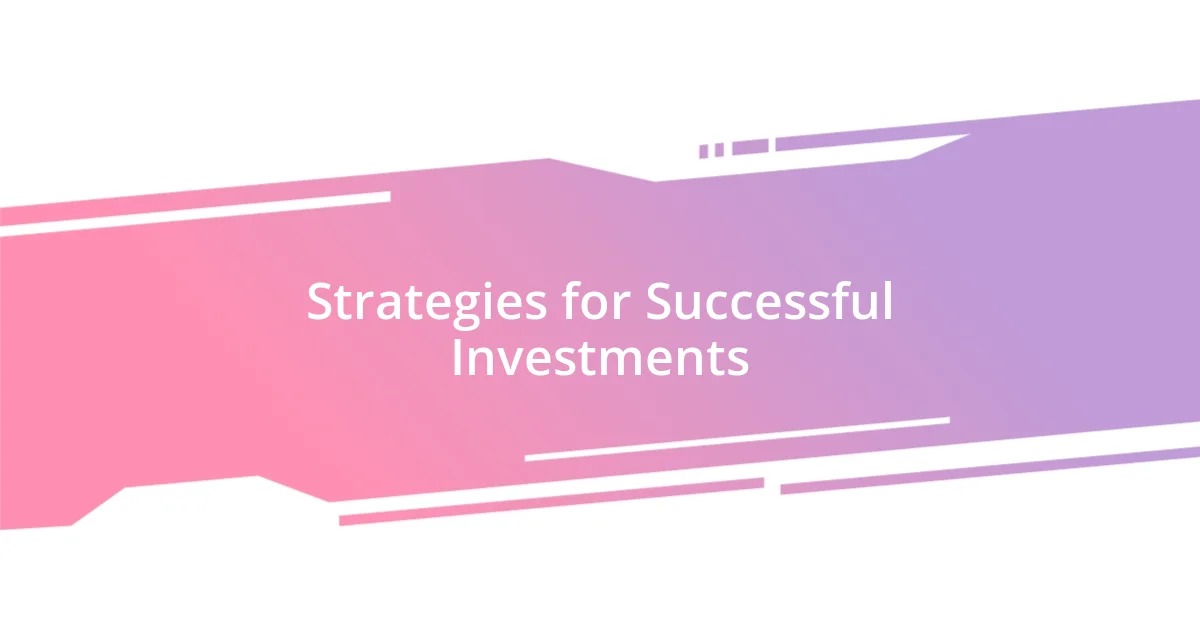
Strategies for Successful Investments
The first strategy that comes to mind is diversification. I remember feeling the weight of uncertainty when I focused solely on one market. So, I decided to spread my investments across different sectors and regions. Not long after, a downturn hit one of those sectors, but my overall portfolio remained stable. It’s like a safety net that cushions unexpected falls. Have you ever thought about how spreading your investments could protect you from market swings?
Another effective strategy is continuous education. I’ve spent countless evenings reading up on global economic trends and investment strategies. I attended webinars and connected with seasoned investors, which was invaluable. Knowledge is not just power; it’s your best weapon when navigating international investments. Have you considered how enhancing your understanding could empower your own investment journey?
Lastly, patience is key in international investments. My eagerness to see quick returns often led to hasty decisions, resulting in lost opportunities. I distinctly remember waiting months for a project in South America to materialize. The wait tested my resolve, but when the time came, the payoff was far greater than I imagined. How do you handle the waiting game in your investment ventures?
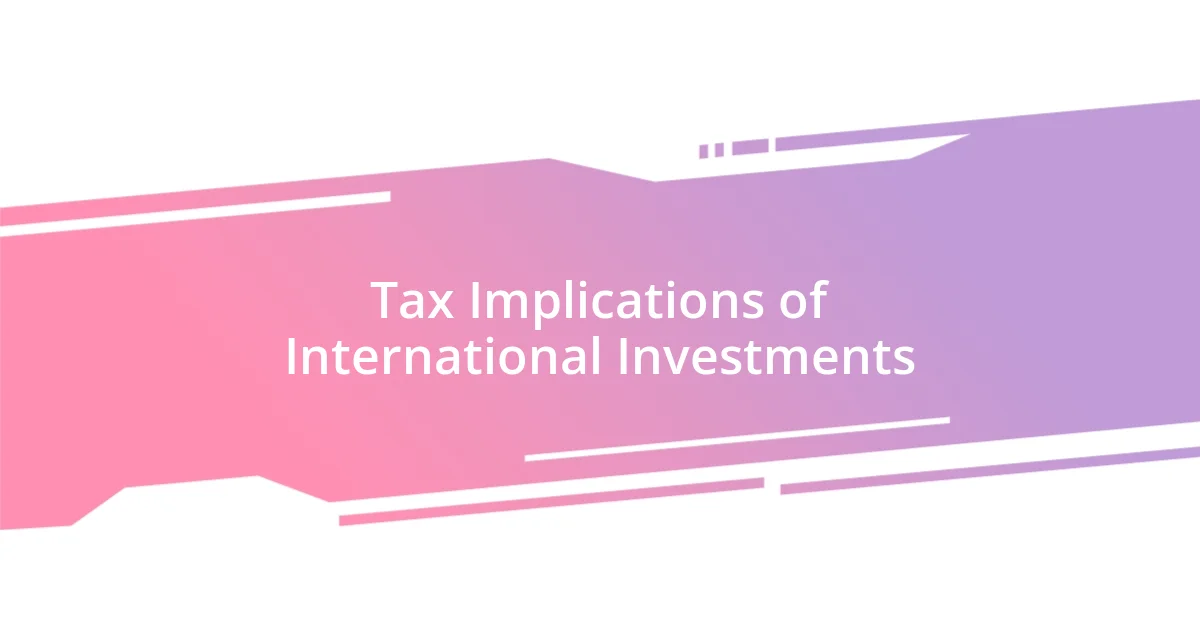
Tax Implications of International Investments
When investing internationally, tax implications can be a complex web to navigate. I can’t tell you how many times I felt overwhelmed by the prospect of double taxation—paying taxes in both the U.S. and the foreign country. It’s essential to check whether the country has a tax treaty with the U.S. to avoid this. Have you ever tried to untangle similar tax situations?
I vividly recall my first investment in a rental property abroad. I eagerly anticipated the cash flow, but I didn’t account for local taxes on foreign income. The surprise tax bill hit me hard, leaving me wishing I had done more research or consulted a tax advisor beforehand. Now, I always review tax regulations in depth before making decisions. What steps do you take to ensure you’re prepared for unexpected tax burdens?
Another critical aspect to consider is the impact of currency exchange rates on tax obligations. When I sold a property in a different currency, I grappled with calculating gains correctly and understanding how currency fluctuations would affect my tax bill. The emotional rollercoaster of watching exchange rates shift while determining my profits was both intriguing and stressful. How have you managed currency-related tax implications in your investments?
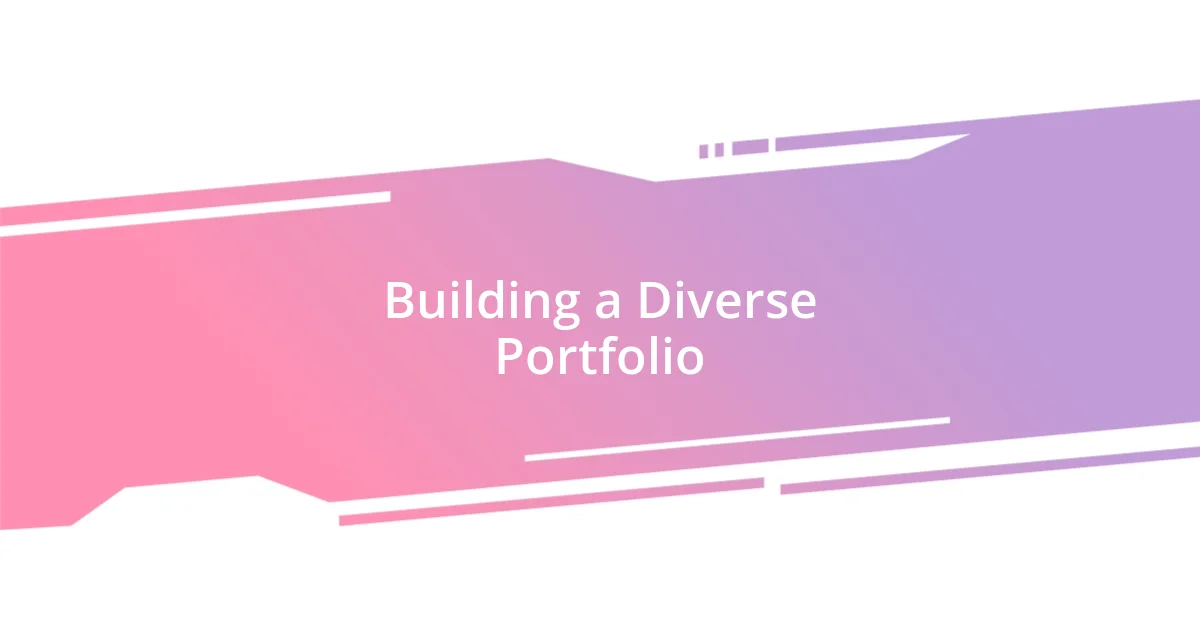
Building a Diverse Portfolio
Building a diverse portfolio is one of the most empowering decisions I’ve made in my investment journey. I once invested heavily in tech stocks, believing their growth trajectory was unstoppable. When the tech bubble burst, I felt that familiar pit in my stomach. It was a stark reminder that relying on a single sector can leave you vulnerable. So, I started exploring different asset classes—real estate, bonds, and even commodities. This shift not only reduced my risk but also provided me with a sense of security I had previously lacked. Have you experienced the relief that comes from knowing your investments are not all tied to one force?
Adding international investments to my portfolio was a game changer. I still recall the thrill I felt dipping my toes into emerging markets. It felt like stepping into a new world filled with opportunities. However, I quickly learned that it wasn’t just about choosing random countries; it required careful research and understanding of those markets. For example, my investment in a renewable energy project in Brazil was rooted in their clear commitment to sustainability. The potential for growth, combined with my interest in environmental issues, made it a perfect fit. Have you ever discovered an investment that resonated with your values?
Moreover, I can’t stress enough how crucial it is to regularly review and rebalance your portfolio. There was a time when I neglected this and watched my allocation drift away from my initial strategy. It’s easy to get comfortable, but markets change, and so do individual needs. I remember the relief I felt after reassessing my investments and making a few necessary adjustments. Suddenly, everything felt aligned again, and my confidence soared. How do you stay on top of your investment game to ensure your portfolio reflects your current goals?

Lessons Learned from My Journey
One of the biggest lessons I learned on my international investment journey is the importance of understanding local market conditions. I remember the excitement I felt when I decided to invest in a burgeoning tech startup in Eastern Europe. I was convinced by the potential and energy I saw. However, as I got involved, it became clear that political instability and regulatory hurdles were significant risks that could impact my investment. It was an eye-opener—sometimes, enthusiasm isn’t enough. Have you ever jumped into something without fully grasping the environment?
Another realization came from the occasional misjudgment of my risk tolerance. I once invested in a high-yield bond in a Latin American country, lured by the potential returns. At first, everything seemed fine until the currency devaluation sent my profits spiraling. The emotional weight of that experience taught me to reassess my risk thresholds continually. Balancing the thrill of potential gains against the reality of possible losses became a crucial part of my strategy. How do you ensure your investment choices align with your true comfort level?
Networking with local investors proved invaluable in enhancing my understanding of international markets. I distinctly recall a gathering of expats in Asia where I learned about opportunities I would have otherwise overlooked. Those discussions opened my eyes to different perspectives and strategies, ultimately enriching my investment approach. I now make it a point to connect with local experts, recognizing that their insights can often uncover hidden gems. Have you ever considered how local knowledge might influence your investment decisions?


